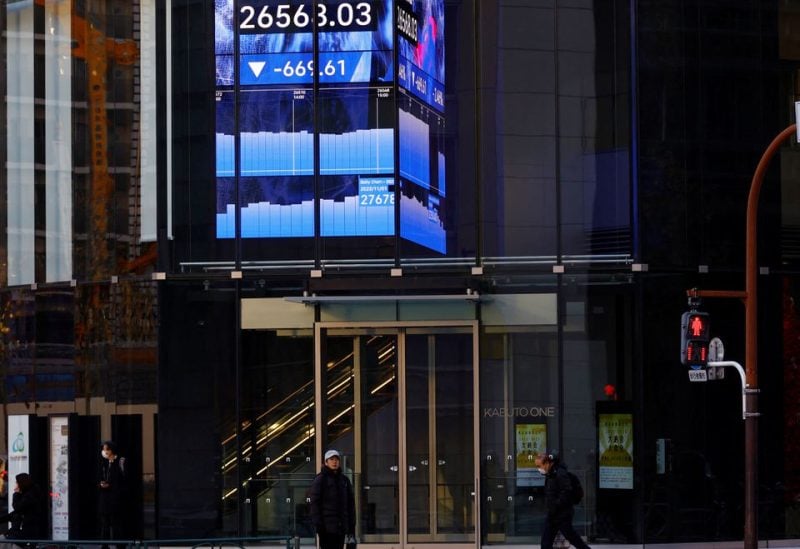
People walk past an electric board showing Nikkei index at a business district in Tokyo, Japan December 20, 2022. REUTERS
Tuesday saw a slight decline in a measure of global equities and a slight increase in the dollar as markets awaited comments from the chairman of the Federal Reserve after last week’s massive U.S. jobs report made it plain that interest rates will remain higher for longer to fight inflation.
The yen climbed after an unexpectedly robust Japanese wage report, while the Australian dollar had surged higher when the central bank of that country emphasized that additional hikes will be required.
U.S. and European equity markets were mixed to lower, with the euro and pound lower against the dollar. The broad pan-European STOXX 600 index was up 0.04% and MSCI’s gauge of global stock performance shed 0.12%.
The spotlight was on central bankers, especially Fed Chief Jerome Powell, scheduled to speak at noon (1700 GMT), as stronger economic data pointed to more stubborn inflation.
The U.S. economy is getting more attention because of Friday’s payrolls number – almost three times greater than market expectations – and because of the upgrades in hiring over the past few months, said Joe Manimbo, senior market analyst at Convera in Washington.
“The market now see the Fed with the upper hand in terms of remaining on this hawkish path,” Manimbo said. “What’s been really important is that the market sees a lower likelihood of rate cuts by the end of the year.”
An ECB survey on Tuesday showed euro zone inflation expectations were still edging up at the end of last year, while Fed Minneapolis President Neel Kashkari said he still thought the U.S. overnight lending rates should rise to at least 5.4% from 4.5%-4.75% range.
“Nobody should over react to one report,” he said, referring to Friday’s payrolls data, but he also noted the services sector remained very robust.
On Wall Street, the Dow Jones Industrial Average fell 0.34%, the S&P 500 lost 0.18% and the Nasdaq Composite added 0.03%.
Asian stocks stabilized overnight after they, like most global share markets, suffered steep losses following that U.S jobs data.
MSCI’s broadest index of Asia-Pacific shares outside Japan ended up 0.2%, but Australia’s S&P/ASX200 slipped nearly 0.5% after the Reserve Bank of Australia delivered its ninth consecutive rate hike. Australia’s cash rate now stands at 3.35%, a decade high.